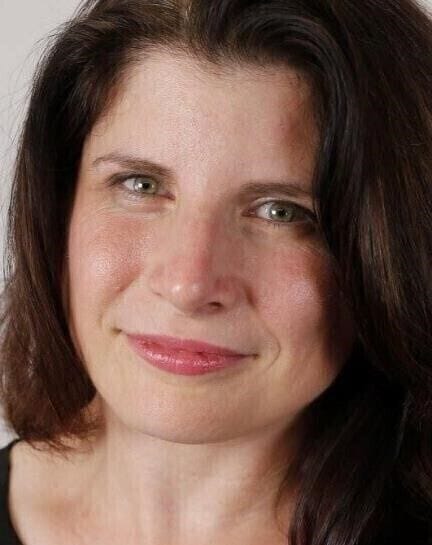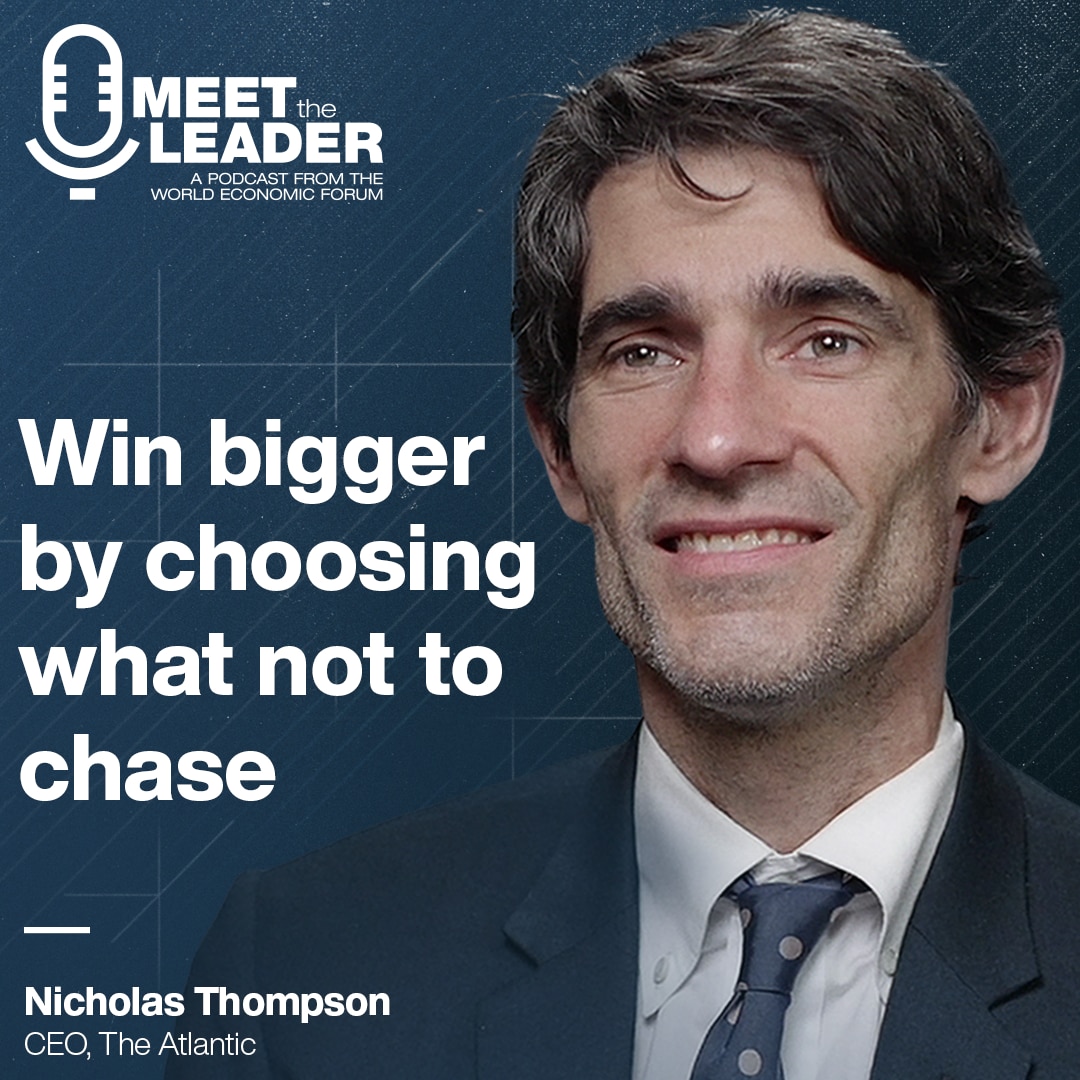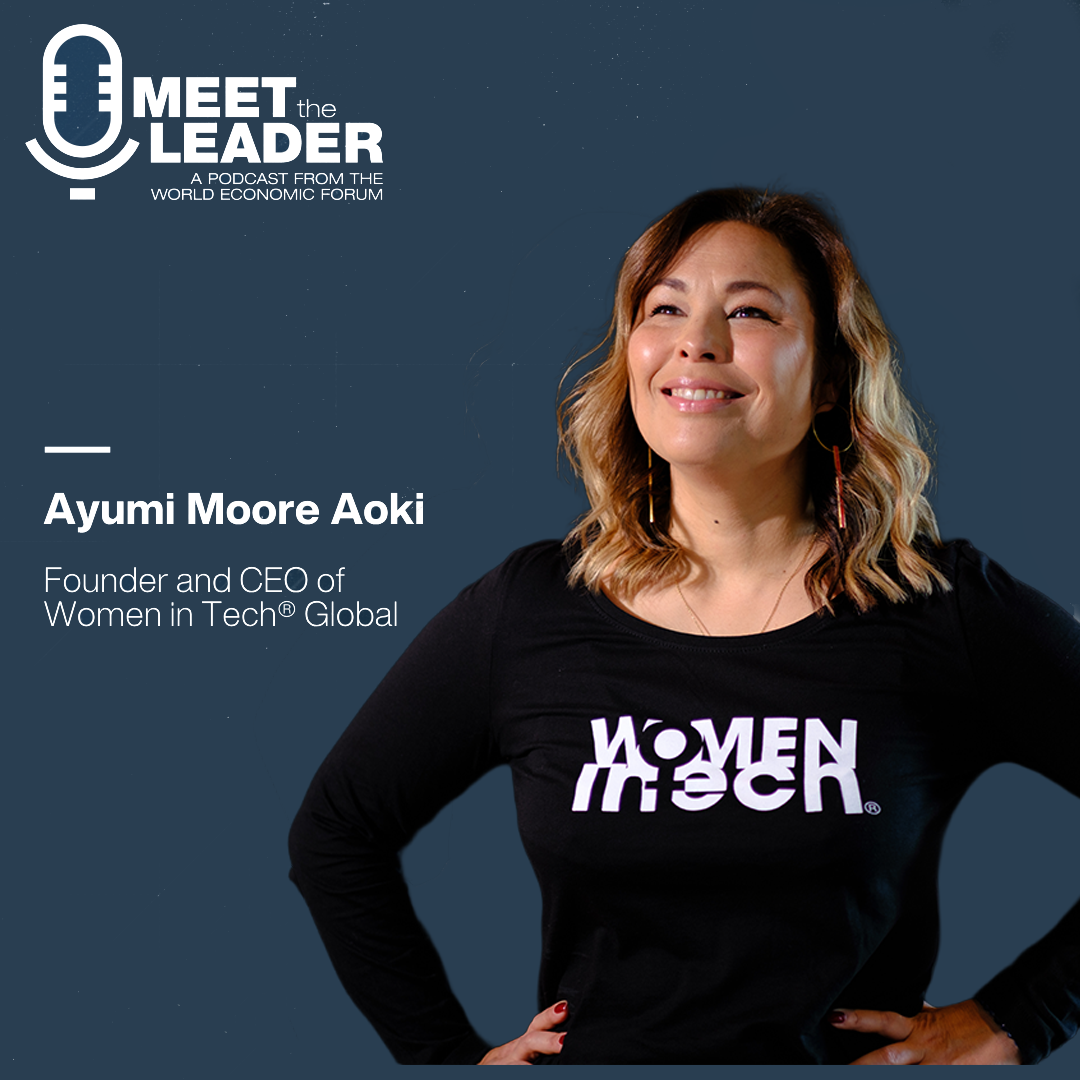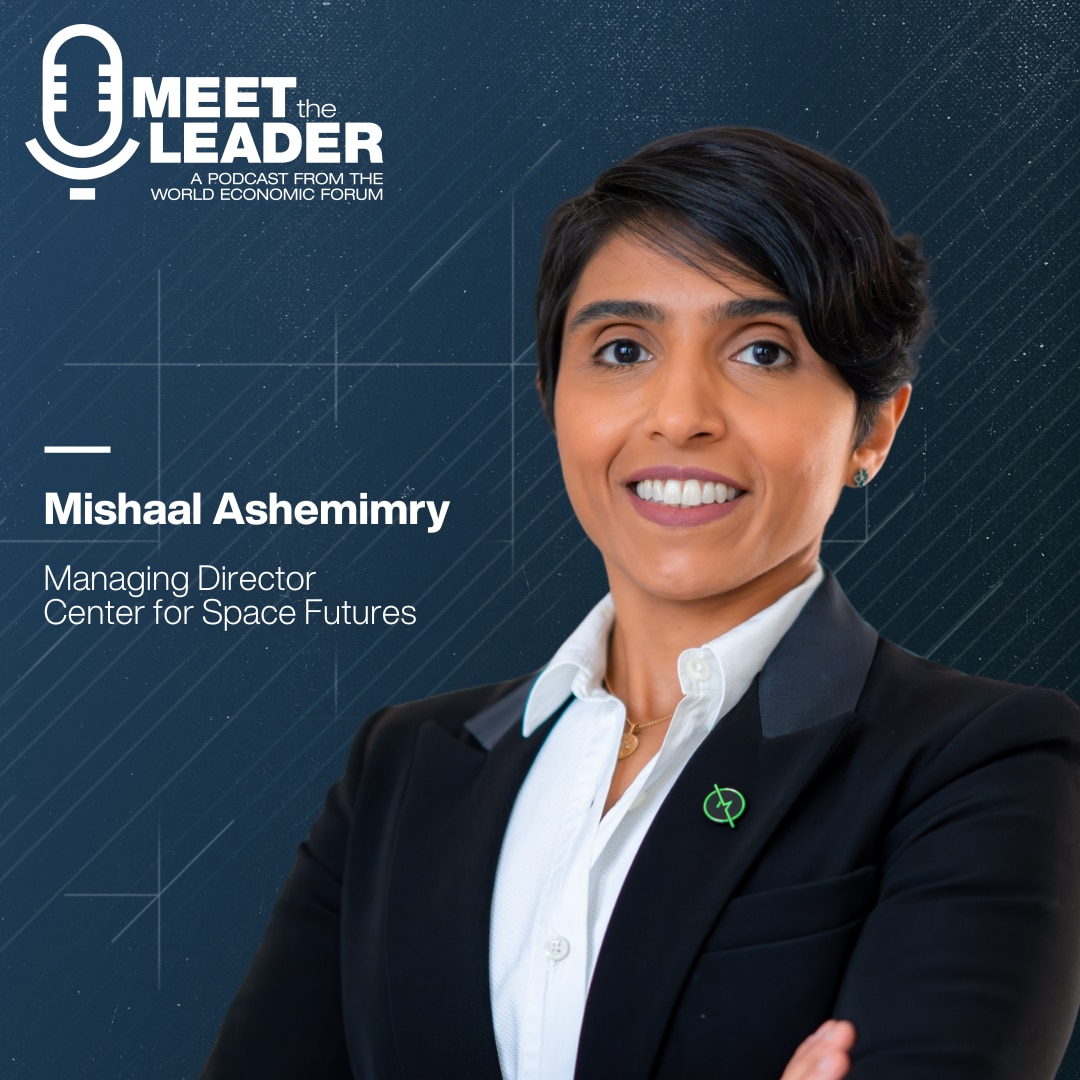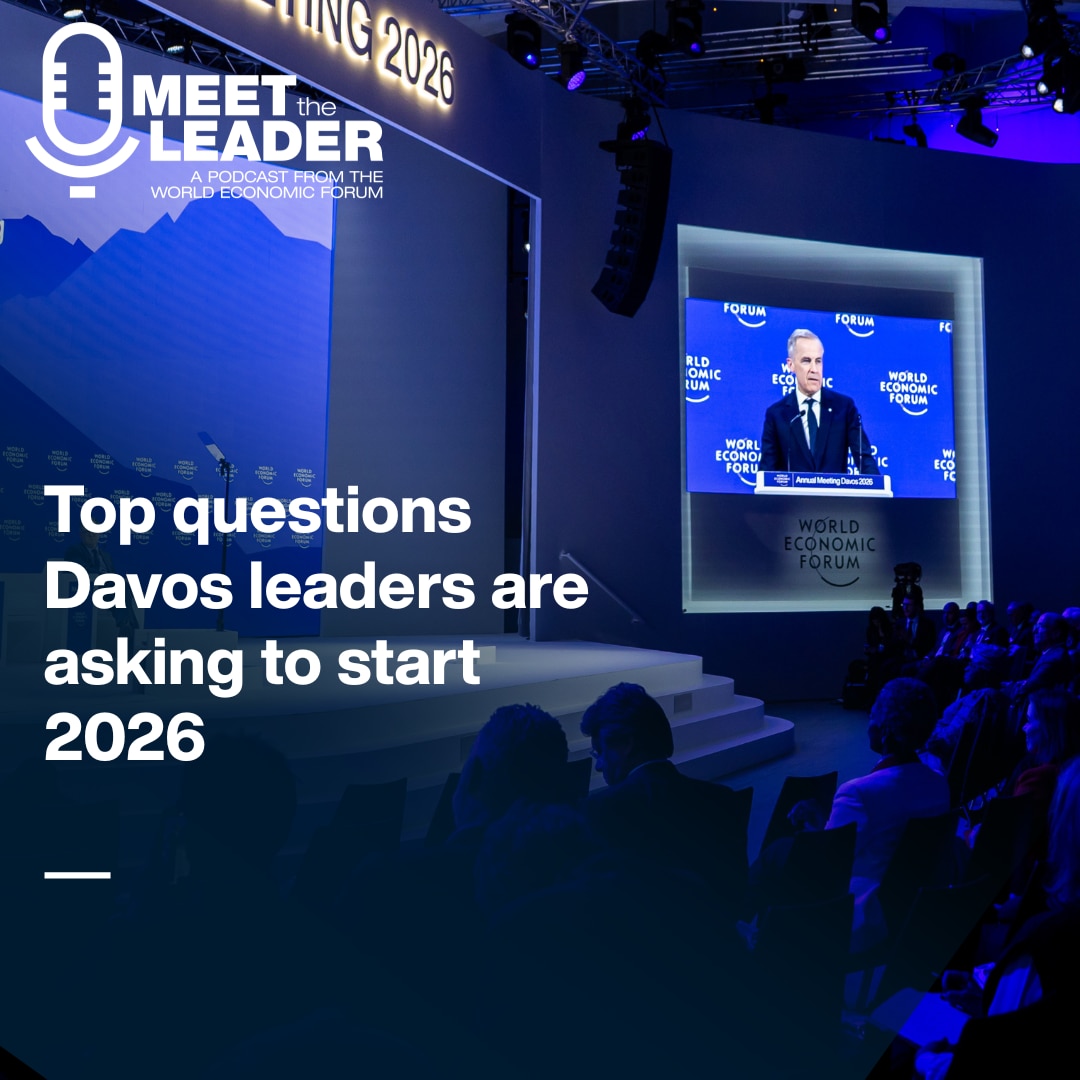13 leaders share the books that changed how they live, think and lead: 2024 Books Roundup
Transcripción del podcast
Christopher Oakes, Reefgen Managing in the knowledge economy requires a fundamentally different approach to how do we manage knowledge work.
Linda Lacina, Meet The Leader Welcome to Meet the Leader, a podcast where top leaders share how they're tackling the world's toughest challenges. Today we break down the top books that have shaped leaders in 2024.
Subscribe to Meet the Leader on Apple, Spotify and wherever you get your favorite podcasts. And don't forget to rate and review us.
I'm Linda Lacina from the World Economic Forum. And this is Meet The Leader.
Alexi Robichaux, BetterUp It's an amazing book and written by Jim Making trucks lions for his living. There are so many strange and uncanny leadership lessons from that book.
Ritu Narayan, Zum It changed everything in terms of my perspective of how you can bring innovation at scale to the world.
Florian Hoffman, The Do It broke my heart -- again. But also it gave me a lot of motivation.
Linda Lacina, Meet The Leader We all have a book that changed us, changed our minds, changed how we solved a big problem, changed how we deal with people.
I interview scores of people each year for Meet the Leader. And sometimes these are C-Suite execs who are responsible for thousands of employees, whose decisions can affect jobs in supply chains and even economies.
Sometimes they're nonprofit leaders, helping people in desperate situations, people who are facing humanity's hardest days. I always feel privileged to sit face to face with these leaders and find out what has given them hope and direction and support. And knowing what has shaped them can be a resource to any of us building out our own toolkits, looking to make big change happen.
This is one of our most popular episodes of the year. Maybe a recommendation on this list inspires a purchase for that hard-to-buy for a person on your gift list this season. Maybe there's - book pick here that finds its way to your own nightstand.
Regardless, see this is our gift to you as we close out the year. I hope it gives you inspiration as you chart your way into 2025.
Book Selection: Liontracker’s Guide to Life
Author: Boyd Varty
Linda Lacina, Meet The Leader We'll get started with books that help us pay attention to what matters. Alexi Robichaux is a co-founder and the CEO of Better Up. It's a coaching platform for leadership and preventative mental health. He talked to me this year about how leaders can better connect with and understand their teams. His book is A Lion Tracker's Guide to Life, by Boyd Varti. Here's what a lion tracker can teach you about prioritizing.
Alexi Robichaux, BetterUp Okay, here's an unconventional one. I think it's a great book in leadership. How much how we show up implicitly affects the culture around us. And so I think one of the biggest imperatives we have as leaders right now is to be the antithesis of the environment around us, which is very hectic. So is like raises the question and us being very centered. And I think this book really gets to the spirit of that. It's called A Lion Tracker's Guide to Life, and it's an amazing book written by a gentleman who tracks lions for his living. And if you track a lion and have any frenetic anxiety, you will not be tracking a lion very long. It will be tracking you. And he really just goes into greater lessons on life. On how do you find your center point? How do you stay composed in very scary situations when you're just literally staring into the mouth of a lion? And there are so many strange and uncanny leadership lessons from that book. And it's a fun read because you get into the plains of Africa and away from the corporate office, but you realize how many parallels there are.
Book Selection: The Goal
Linda Lacina, Meet The Leader Mark Lundstrom is the CEO and founder of Radia. That's an energy company building the world's largest plane. These planes will make offshore wind power available onshore and carry blades as tall as the Eiffel Tower. Mark talked to me about this and also the very practical strategies that he's employing to speed work on the energy transition, including being disciplined about driving innovation with only existing technologies. To that end, he shares a very practical book. Here's why it helped him and why any leader should consider it.
Mark Lundstrom, Radia The book that probably has been most impactful for me was a book called The Goal, which is about 30 years old and all about operations management and lean production.
And so our company and the industry needs to embrace sort of lean manufacturing in production. And that just makes everything in the business world, both in terms of business processes and manufacturing processes go a lot faster.
The leadership that we've hired on the development side comes from the background of lean manufacturing. And so they're very attuned to what has to happen with lean manufacturing. And that in turn means that the supply chain that we bring on also has to embrace the concepts of lean manufacturing.
A lot of the processes, business processes that are generally set up in the natural course of building a business can be fundamentally rewired so that everything becomes just more apparent and more efficient and more fun.
Book Selection: The Subtle Art of Not Giving a ****, by Mark Manson
Linda Lacina, Meet The Leader Sahil Tesfu is the chief strategy officer at Essity That's a global health and hygiene company that sells product in more than 150 countries. She shared a book that I have on my own shelf, one that will make you laugh and help you recalibrate.
Sahil Tesfu, Essity There a book that I recommend I book that I recently read which I really enjoyed and which might sound a bit popular and maybe even cheesy: It's The Subtle Art of Not Giving a ****. It's a book that I really enjoyed reading because I think it's a lot of spotlight on the fact that in many situations that you're in, whether it's in your private life or in your in your professional life, where maybe you lose a little bit compass of what your own values might be because you get distracted by everything that's going on around you. And to really, stay focused on yourself and to listen in words as much as you can to understand what really drives you, what you are really passionate about, what do you really want to achieve in life as opposed to what other people expect you to achieve in life?
I think the book was a good reminder for exactly that, and I think also really good reminder to remove your ego from a lot of the situations that you face in life. And I think that ability to understand when it's your ego talking versus something else, I think that's a very important muscle to build and definitely one that I also continuously tried to train.
Book Selection: A World Without Email, by Cal Newport
Linda Lacina, Meet The Leader Christopher Oakes is a marine biologist and the CEO of ReefGen. That's a startup whose underwater tractors replant seagrass and coral, restoring ocean ecosystems. Many of the technologies and robots that they have built are the first of their kind. And it's fitting that his book looks at ways we can rethink how we work for a new future. Here's Christopher.
Christopher Oakes, Reefgen So I really have become a fan of Cal Newport. His book, [A World Without Email] stands out to me in that management. Management structures today are very much related to the Henry Ford assembly line era. And so managing in the knowledge economy requires a fundamentally different approach to how do we manage knowledge work.
And I don't think humans have figured it out yet, but it's a recognition that the way we communicate and the way email and slack and on, and text message and all these things, it can be wonderful, but it can also create quite a constraint. And the way we measure productivity and then the way we communicate with our teams needs to be challenged. I don't have the answers. I think Cal Newport offers some great examples in the book, and I would highly recommend it to anyone out there.
Book Selection: Blood in the Machine, by Brian Merchant
Linda Lacina, Meet The Leader Innovation is always top of mind for our leaders, including Brad Smith. Brad Smith is the president of Microsoft and the host of podcast Tools an Weapons. His role and that podcast sit at the intersection of culture and technology and on Meet the Leader he talked with me about shifting technologies and the responsibilities leaders have to navigate that changing context.
So it was fitting that his book pick took us back to the Luddites and what that can teach us about AI. Here's Brad Smith on Blood in the Machine by Brian Merchant.
Brad Smith, Microsoft It's all about the first wave of the Industrial Revolution, when mechanization and automation started to spread across England in the late 1700s and the early 1800s, and it led to this massive improvement in productivity. But workers rose up. The so-called Luddite movement, where workers literally broke the machines because of what they saw doing to their society.
It's extraordinarily thought provoking in sort of obvious ways when you think about where we are with A.I. today. And I think it is, in a sense, a cautionary tale. It shows what can go wrong and provide some insights into how to avoid those things going wrong.
But I think even more than that, it provides a very personal glimpse into the lives and the beliefs and the worries of the people who were living in that time, as well as their hopes and aspirations. And you see that reflected in the hopes and worries of the people of our own time as they think about, for example, what AI will mean for societies around the world.
Book Selection: The Flywheel Effect, by Jim Collins
Linda Lacina, Meet The Leader Serge Raemaekers is the co-founder and executive director of ABOLOBI That is a social enterprise based in South Africa that both innovates and co designs, technologies that help small scale fishing communities collect data to better understand what is going on in our oceans, all to protect biodiversity and local economies. His pick can inspire anyone looking to make business work for people and planet.
Serge Raemaekers, ABOLOBI There's so many books, but maybe one book that comes to mind and which is linked to something I said earlier on is turning the flywheel. It's a short book, which is very handy when you run a social enterprise and you don't have much time. But it's to the point. And it really for me as a fisheries scientist, being a more of an accidental social entrepreneur and really trying to drive economic principles in the self-sustainability of our organization, finding that flywheel, finding that product market fit, finding something within your social enterprise that you can bolt on at a later stage, but that starts to operate as a flywheel is is absolutely critical.
Book Selection: The Innovator’s Dillemma, by Clayton Christensen
Linda Lacina, Meet The Leader Clayton Christensen is often considered the architect of disruptive innovation. And his books are a time honored favorite with our guests. Ritu Narayan knows a little something about disruption. She invented Zum -- that is a school bus startup with a first-of-its-kind platform that brought the classic yellow school bus into the digital age, all while transforming one of the largest transportation systems in the U.S.. Here's Ritu on how Clayton Christensen's Innovator's Dilemma informed how she thinks about disruption and scale.
Ritu Narayan, Zum There are lots of books, and I'm an avid reader, especially of nonfiction and business, but there's one specific book by Clayton Christensen. Innovator's Dilemma. We change everything in terms of my perspective of how you can bring innovation at scale to the world and how innovation can die. And I love that book.
Linda Lacina, Meet The Leader If somebody reading that, how would it change them?
Ritu Narayan, Zum The biggest thing you would realize is there is a cycle. There's a cycle of how innovations happen. And the people who are existing players in the market, how they ignore that innovation because there's a whole cycle of first they laugh at you, market you and then they compete with you and then they're super scared about you. And that's the exact phenomenon, even via Zum or facing from the legacy provider that's happening. And then once you become big and you become giant, you are also actually in equal danger. If you don't take care of and look at the continuously evolving yourselves. That's why there's so few companies in the world which continue to innovate year after year while others die.
Book Selection: How Innovation Works, by Matt Ridley
Linda Lacina, Meet The Leader Jordan Justus is the CEO of Automotus That's a curb management company that works with cities and airports and communities to monitor and automate what happens on city curbs. These just happened to be secret untapped weapons for tackling everything from emissions to accessibility. His book tip helps us see innovation as more than just a new bell or whistle, but a way to better understand the role that cross-sector collaboration really can play.
Jordan Justus, Automotus How Innovation Works is a great book on just the process of innovation broadly and how many people think, I think, generally in technology, that there are 'aha' moments and there are these really big inflection points. But generally what we've seen from our experience and what I think I've learned broadly about innovation is that it's such a collaborative and in many ways a slow process. And while people think the world is going to change overnight, it really does require people coming together in collective action to implement things that will improve living standards for people broadly.
Book Selection: Leading from the Emerging Future, by Otto Scharmer
Linda Lacina, Meet The Leader Of course, the most effective leaders know themselves well, and some of our leaders picked books that can help you look within. Catalina Cock Duque is the founder of Fundacion mi Sangre. She suggested Leading From an Emerging Future. That is a book by Otto Scharma that makes the case that to meet the challenges of this century, we will need to get away from "ego-systems" focused on the self to real "ecosystem" awareness, focused on the greater whole. Here's why that's so important to Catalina.
Catalina Cock Duque, Fundacion mi Sangre
Leading from the Emerging Future, by Otto Scharma. It has really inspired my work. I think they would understand the importance of being present, of connecting to yourself and making sure that you let go of paradigms and old ways of being and seeing the world to connect to a future that is already emerging.
Book Selection: Homo erectus, by W. Henry Gilbert
Linda Lacina, Meet The Leader Christophe Catois is the president of Adecco that is a staffing and recruitment firm with offices in more than 60 countries. He shared with me a book pick that can get you grounded in the past to better prepare for the future. Here's Christophe on Homo Erectus by W Henry Gilbert.
Christophe Catoir, Adecco It's important to know where we are coming from to understand how you build the future with technology, etc. to keep what was the basis of the community of human. And how will you use this community of human to leverage technology as an enabler and not as a destination. And I think this is pretty exciting about what you need to preserve from the past in order to build your future.
Linda Lacina, Meet The Leader Some books helped our leaders see things in new ways. That was the case with Kara Alaimo. She's a professor at Fairleigh Dickinson University and the author of a book of her own: Over the Influence: Why Social Media is Toxic for Women and Girls and How We Can Take It back. She shared a couple of books that deepened her understanding of systemic barriers. Books that can help anyone better bridge gaps.
Book Selection: Down Girl: The Logic of Misogyny, by Kate Manne; Hood Feminism, by Mikki Kendall; Invisible Women, by Caroline Criado Perez
Kara Alaimo, Fairleigh Dickinson University So I recently wrote a piece for Shephard recommending the five books about being a woman in this sexist, misogynistic world that I recommend. One of them is Down Girl by Kate Manne. And she defines sexism, which is men thinking they're better than women. And she defines misogyny, which is men punishing women for causing displeasure to them. And I think once you know those definitions, you find examples everywhere you go.
I'm also a big fan of Hood Feminism, which is a. Really powerful account of so many of the issues that black women and girls are up against in our society. I also really like Carolyn Criado Perez's book Invisible Women, which looks at how our society has literally been built for men.
And so things like public transport systems are designed to get men where they typically go to the city center for work and often not designed very well to get women where we often go, which is all over town caring for people.
So after I read this book, it all of a sudden started to make sense to me. Why my car's voice recognition system never seems to understand me because they tend to be trained on men or things like why there's always a line for the ladies room in public places. So that's another great book I recommend.
I think it's so important for all of us to recognize what sexism and misogyny are and to call them out in every aspect of our lives, both offline and online. When we see them we need to have conversations with people. We need to tell people what's wrong with their behavior, what's wrong with what they've said or how they've judged women. And ultimately, we need to socially stigmatize these practices.
Book Selection: Lord of the Rings Series, J. R. R. Tolkien
Linda Lacina, Meet The Leader I'll finish this episode with a couple recommendations from literature. Jonathan Reckford is the CEO for Habitat for Humanity International. That's a nonprofit that builds and advocates for affordable housing all around the world. His pick is a favorite you might already have on your shelf, Lord of the Rings. But here's a reason why you might pick it up again.
Jonathan Reckford, Habitat for Humanity If you want to stretch your mind, it's easy to be easy to name a bunch of business books. But I would, as the son of a classics professor, if you haven't read it, read. J.R.R. Tolkien's The Lord of the Rings because it's a deep story of both good and evil, of sacrifice and heroism. And it will. I actually think, as my daughter keeps telling me, it's really important to read fiction since I read mostly nonfiction. But it is. But I think we all need a little inspiration.
You know, my hope is it would encourage people because it's ultimately a hopeful book. And also it was written in a context with the World War of reminding people that we all have to take an active role in building democratic societies because we can't assume that if we don't contribute to creating better societies, that we can keep having all the benefits we enjoy.
Book Selection: Candide, by Voltaire
Linda Lacina, Meet The Leader Florian Hoffmann is the founder of The Do a platform for entrepreneurs that runs a special anti-business business school focused on helping leaders implement tangible, real world solutions. His book is a classic as well, and it's one that spurred him on at the start of last year. It's one that can give any of us the motivation to push for change at any time, especially now as we take on 2025.
Florian Hoffman, The Do Other than that, I, I just had because of how dire the world looks like. I reread Voltaire's Candide, which is sort of a study of optimism, and it broke my heart again. But also it gave me a lot of motivation for 2024 to keep getting involved, which is what I would ask everybody listening to this, that no matter where you stand, there's so many challenges. It requires all of us to get involved. There's no time for apathy.
Linda Lacina, Meet The Leader Thanks so much to all of the leaders who have spoken to me this year, and thanks so much to you for listening. Find a transcript of this episode as well as transcripts from my colleague's podcast, Radio Davos at wef.ch/podcasts.
This episode of Meet the Leader was produced and presented by me with Taz Kelleher as editor and Gareth Nolan driving studio production. That's it for now. I'm Linda Lacina with the World Economic Forum. Have a great day.
Looking for a new read? Something that will make you sharper in 2025 or something for that hard-to-buy-for person on your list? Or maybe you just want closer access to the ideas shaping today's brightest changemakers. No matter the reason, look no further than our annual books roundup, an episode collecting books that have transformed how some of the top global leaders manage teams, get inspired, shift mindsets and make progress. This year's recommendations include fresh takes on classic business books, histories, time-honored works of literature, and new favorites that can change how you build and lead.
Alojado por:
Más episodios:
La Agenda Semanal
Una actualización semanal de los temas más importantes de la agenda global
